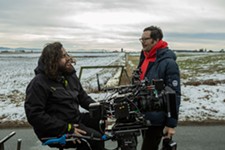SXSW Interview: Leah Purcell Writes and Rights History in The Drover's Wife
Australian filmmaker takes a classic and gives it three lives
By Richard Whittaker, 7:30AM, Thu. Mar. 18, 2021
When Leah Purcell debuts her new film, The Drover's Wife, at SXSW today it will not only bring a classic Australian story to the screen, but it will be a retelling that has become already become synonymous with the actor, writer, and director.
Purcell has been circling her adaptation of Henry Lawson's 1892 short story for years, giving it three new lives. First, as a play; then as a novel; and now, in its final form, as a feature. Lawson's original, first published in The Bulletin magazine, is a much shorter tale: a woman, on a remote farm, tending to her children while her husband is off working as a drover. Yet it was quietly revolutionary: women like her, and the lives they lived, were not published, not known. Purcell's version keeps that spirit but broadens it beyond Lawson's narrow focus, to more fully explore questions of race, gender, class, violence, nascent liberalism, and the role institutions play in them, all against the setting of colonial Australia.
Austin Chronicle: For non-Australians, where does Lawson, and his story, stand in popular culture?
Leah Purcell: In Australia, it's a much-loved classic. My partner described Lawson as Australian's Mark Twain [but] for international audiences it doesn't matter if you know Henry Lawson's story or not. I think they're going to get the film.
What I'd done with this film was that I'd done a test run with the play, and that tested the waters for me of how the audiences would react. Of course they thought they were getting a literal translation of Henry Lawson's short story - a one-woman show with a monologue about the black snake. I had people planted in the audience at night, just listening, and it was amazing. My partner described it as like being a fun park: the guards came down and locked them in, and away we went.
There were 16-year-olds who were studying Henry Lawson and Banjo Paterson, and then I knew I was going to grow up with the loyalists who heard the stories from their parents, or from their grandparents. And then there were these two elderly ladies with walking frames who were leaving the theatre, and the artistic director followed them out. What they head was, "That was great," and "Yep. That's our history."
What was great was that I would go out into the foyer and there would be a lot of women staying around, drinking champagne, toasting themselves, toasting their toasting their daughters, toasting their mothers, toasting their grandmothers, toasting the women of 1893. There were also some men who were looking a little sad into their red wine, and I would go over and say, "Are you OK?" and they'd say, "I'm just thinking about the future of my daughter, and what I hope for her."
People were expecting one thing, and I turned it on its head. People who know my work know I like to do that. I'm not going to please everyone - there's lovers and haters - but I feel like I've done a justice to his story. I didn't turn anything in a nasty way. I just told, I guess, my truth, my family's truth, the truths of that history that was not told at that time.
AC: Were you always intending to make a film version?
LP: We always had the film in our mind. Whenever we do any projects, we try to get as much as we can out of them. When I wrote the play, my partner, I gave him the first draft and he went, "There's a film in here," and I went, "I know, but let's get the play out." Then at night, for me to wind down, I would come home and work on the screenplay ... and what I couldn't fit in the film, I wrote the novel as well. So I just had a ball with this story, opening it up and running on pure adrenaline and fear and the prayer of not getting it wrong. I came back to reminding myself: theatre, I can articulate with words; film, let the vision talk; and with the novel I could put anything and everything in it.
AC:: You've been in Molly's boots for years now. How has she changed for you as a performer between stage and screen?
LP: Well, I didn't have to learn all those lines. Molly spoke less in the film, and I gave everyone else the dialogue. That was partly me going, "I'm going to have to direct this bloody thing as well!" So I chopped a lot of her lines right down.
And of course there's the physicality. I did my own fight stunts in the film, and of course there are fight stunts in the play. That was interesting because in the play you only get one chance, but in the film that was a bit tiring. For example, when she falls on the ground and there's a gunshot, I did that 12 times.
AC: One major addition in your adaptation is the pairing of Louisa and Nate, the couple who move to the nearby town. They're the epitome of the perils of good intentions.
LP: It came with, "How do I invite my non-indigenous audience, who are probably 99.9% of my audience, into the world and make them feel safe to travel on a journey?" But also, through Louisa and Nate, how alien they are in this space.
But you're right, they did come with good intentions. My true reason behind them was that, amongst all the wrong that was done, there were people who were trying to understand, and trying to do the right thing. You could spin off and tell a story about Nate and Louisa, and how they're trying to come to an understanding. There are still good people that are interested, from the goodness of their heart or their understanding or their connections in life, that do understand the indigenous cause, that do understand the past, that do the history that has been done, and are still working today, to work with and support. Because I've had really great non-indigenous people lend me a helping hand, lend my mother a helping hand. But I just wanted to bring that forward in the film.
The Drover's Wife: The Legend of Molly Johnson
Narrative Spotlight
World Premiere
Available from 2pm, Thu. March 18
A note to readers: Bold and uncensored, The Austin Chronicle has been Austin’s independent news source for over 40 years, expressing the community’s political and environmental concerns and supporting its active cultural scene. Now more than ever, we need your support to continue supplying Austin with independent, free press. If real news is important to you, please consider making a donation of $5, $10 or whatever you can afford, to help keep our journalism on stands.
Kevin Curtin, April 18, 2021
Shane Pfender, April 7, 2021
July 12, 2024
July 12, 2024
SXSW 2021, SXSW Film 2021, The Drover's Wife: The Legend of Molly Johnson











